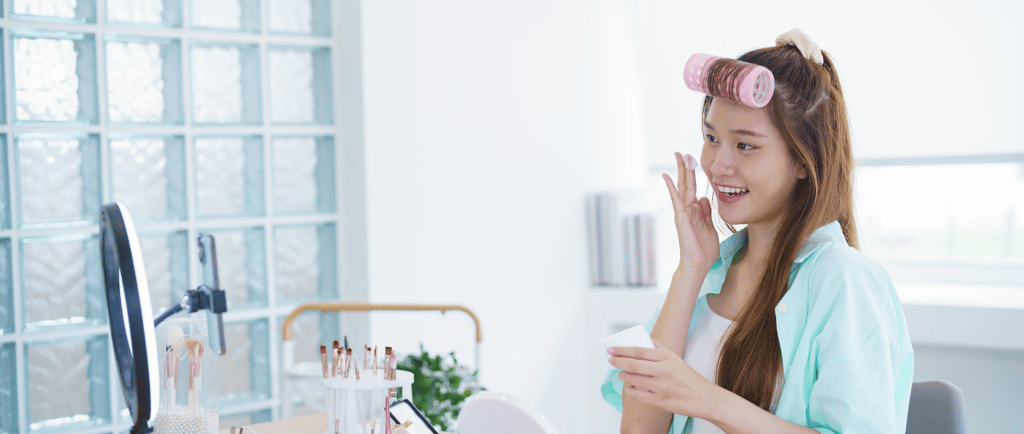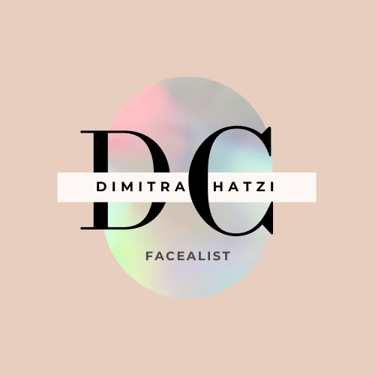How Viral Skincare & Supplements Are Stealing Our Youth's Glow
The rise in beauty and wellness obsession among young people, largely fuelled by social media, presents significant risks to both their physical and mental health, highlighting the urgent need for parental awareness, media literacy education, and professional guidance.
TEENAGERS SKINSKIN EDUCATIONPARENTS TO BEROUTINE AND HABITS
Dimitra Chatzi
5/30/20256 min read


As someone deeply immersed in the digital landscape and a keen observer of societal trends, I've been watching with growing concern as a new phenomenon grips our youngest generations: the "Sephora kids." It’s a trend fueled by the relentless scroll of TikTok, Instagram, and YouTube, where children as young as seven are meticulously applying elaborate skincare routines and reaching for supplements, all in pursuit of an elusive, idealized image. And from my vantage point, the alarms are ringing loud and clear about the very real physical and psychological damage this is causing.
The Skincare Scramble: What I’m Observing on Young Faces
It's truly astonishing to witness how these viral beauty trends have permeated the lives of pre-teens. I've seen firsthand the pressure on these young individuals to adopt complex, multi-step skincare regimens, often mimicking what they see their favorite influencers doing. A recent study, which I found particularly eye-opening, delved into the TikTok skincare routines targeting teens, and its findings resonated with what I've been noticing.
Here’s what really stood out to me:
Product Overload & Jaw-Dropping Costs: I’m seeing kids, some barely out of elementary school, using upwards of six, twelve, or even fourteen different products on their faces daily. This isn't just about excessive application; it's about the financial burden. These routines, which can easily cost hundreds of dollars, are a hefty price for parents to pay, especially when the products are often entirely unnecessary.
A Cocktail of Harsh Ingredients: The sheer number of active ingredients being applied to young, delicate skin is alarming. I’ve noticed a significant presence of chemical exfoliants, such as citric, lactic, glycolic, and salicylic acids – ingredients typically reserved for adults battling anti-aging concerns or for teenagers with specific acne issues. Even more concerning is the increasing use of retinol and retinoids by children as young as ten. It's like an assault on their skin barrier. Additionally, a concerning number of products contain inactive ingredients that are known to cause allergic reactions.
The Unseen Risks to Untouched Skin: Dermatologists I’ve spoken with, and indeed the research I’ve followed, consistently emphasize that young skin is simply too "new and delicate" for such aggressive products. I've personally seen the fallout: increased skin irritation, heightened sun sensitivity (especially when sun protection is often neglected), and allergic contact dermatitis – a skin allergy that can become a lifelong battle. It’s heart-wrenching to witness a young person suffer a visible skin reaction from over-application.
The Sunscreen Oversight: One of the most glaring omissions I've observed in these viral daytime routines is the lack of adequate sun protection. Many of these active ingredients increase sun sensitivity, making the absence of sunscreen a dangerous oversight. It's a recipe for long-term skin damage, not healthy glow.
As Dr. Molly Hales aptly put it, there is "very little benefit" for tweens and teens using these powerful exfoliants unless they have specific skin concerns, such as acne. And Dr. Emma Wedgeworth hit the nail on the head when she said products are often chosen for "the wrong reasons" – packaging or viral trends, not genuine need. From my perspective, this trend is teaching children to blindly apply harsh chemicals without understanding their purpose or potential harm.
The Supplement Scrutiny: A Troubling Link to Body Image
Beyond the realm of skincare, I've been equally troubled by the rising trend of supplement use among teens, particularly in connection with body image. A recent study I came across cemented my concerns, highlighting a significant correlation between muscle-building supplements and muscle dysmorphia – an obsessive focus on achieving a lean, muscular physique.
Here's what I’m finding particularly worrying:
Body Image Battleground: I'm witnessing more and more teens grappling with negative body image, unrealistic diet regimens, and heightened anxiety, all seemingly amplified by their reliance on supplements. As Mia Jones, a mental health professional, warns, this chase for an ideal body can sadly escalate into serious issues like body dysmorphic disorder or eating disorders.
An Unregulated Wild West: The supplement industry is a largely unregulated frontier, and from my vantage point, the lack of long-term research on their safety for teenagers is a massive red flag. I've even heard reports of some common supplements containing harmful chemicals, which is incredibly concerning.
A "Quick Fix" That Fails: It appears many teens are turning to supplements as a "quick fix" for low self-esteem or body dissatisfaction. But what I'm observing is that this reliance can become an unhealthy coping mechanism, creating a cycle of seeking external validation rather than fostering internal resilience. This, in turn, can unfortunately lead to increased anxiety and mood disorders.
Social Media: The Unseen Architect of Youth Vulnerability
Based on my extensive observations, social media is undeniably the primary driver behind these disturbing trends. It’s a powerful engine that continuously exposes young people to unattainable beauty standards, creating immense pressure to conform.
The Illusion of Perfection: I see platforms constantly bombarding teens with "idealized body images" and seemingly perfect lifestyles, often digitally enhanced and far removed from reality. This creates a "distorted version of reality," a narrow, often impossible standard of beauty and physique that deeply affects their self-perception.
Erosion of Self-Worth: The constant bombardment of "flawless faces and contoured features" is, in my opinion, deeply eroding a teen's self-worth. I’ve seen this contribute to lower self-esteem, negative self-talk, and even more serious issues like eating disorders and depression. Ellen Atlanta's perspective truly resonates with me: this industry seems to "thrive on eroding self-esteem in young people, ensuring a lifelong dependency on its products." It's like a subtle form of "death" for teenage girlhood, teaching children that beauty is a "necessity" and their natural face is a "flaw."
The Consumerism Trap: I've also observed a disturbing "unhealthy connection between beauty and consumerism." It's unsettling to see children as young as seven actively creating skincare content online. This early exposure means Generation Alpha is undeniably "more image-conscious" and highly susceptible to the relentless marketing efforts of beauty brands through influencers. The pursuit of likes, comments, and followers creates a dangerous cycle of insecurity if the desired validation isn't received.
My Advice: Guiding Our Youth Towards Real Well-being
Given everything I've seen and learned, I believe it's absolutely crucial for parents and young people to be proactive and informed.
My Stance on Social Media Limits: I strongly advocate for limiting social media access for younger children. Based on Pediatrician Dr. Molly O’Shea's recommendation to wait until at least 13 years old it aligns perfectly with my observations on how these platforms can negatively impact developing minds.
Simplify, Simplify, Simplify Skincare: From my perspective, tweens and teens do not need complex, multi-step routines. A gentle cleanser, a good moisturizer, and a daily mineral-based SPF 30 or higher are typically all that's necessary for healthy, happy skin. I’m firm believer in avoiding harsh ingredients like high-percentage glycolic acid, salicylic acid, retinol, retinoids, or heavy fragrances unless under strict professional guidance.
Open and Honest Dialogue: I've found that open, nonjudgmental conversations are key. Parents need to engage with their children about these social media trends. Ask them what they like about a trend, what they hope to achieve, and gently explain that not all online advice is safe or science-backed, especially for their young, developing skin.
Holistic Health First: I believe we need to shift the focus from appearance to overall well-being. Encourage critical thinking about media images, celebrate diverse representations of beauty, and help them understand that elaborate routines aren't a prerequisite for health or self-care.
Don't Hesitate to Seek Expert Help: If concerns about body image issues or supplement misuse arise, I strongly urge parents to seek a "multifaceted support approach." This could involve individual counseling, family support, and consultations with nutritionists or board-certified dermatologists who can provide tailored, professional guidance.
Embrace Healthier Alternatives: Instead of potentially harmful supplements, I champion balanced nutrition, regular physical activity, and mindfulness as far healthier pathways to well-being.
Ultimately, my goal is to foster awareness and understanding, empowering young people to navigate beauty and wellness trends responsibly. It's about protecting their physical and mental health, and crucially, teaching them that "appearance doesn’t equal value." They deserve to grow up knowing their worth extends far beyond the "cosmetic gaze" of social media.
Sources:
https://www.parents.com/is-your-teens-supplement-routine-harmful-to-their-body-image-11687960
https://www.independent.co.uk/life-style/sephora-10-year-old-girls-tiktok-b2472794.html
https://www.independent.co.uk/life-style/north-west-skincare-routine-tiktok-b2236438.html
https://journals.plos.org/mentalhealth/article?id=10.1371/journal.pmen.0000217
https://www.parents.com/gen-z-wants-to-be-social-media-influencers-8349212
